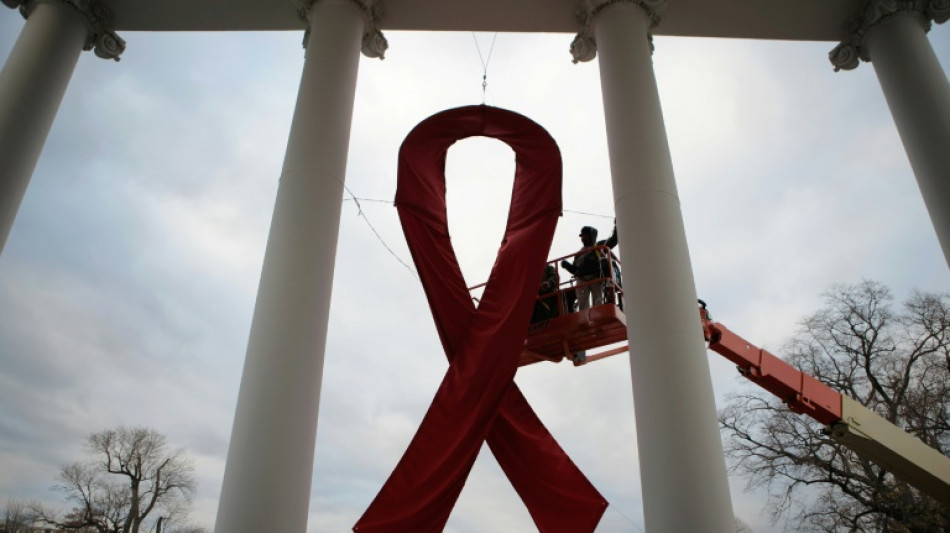
-
 Japan's Panasonic targets 10,000 job cuts worldwide
Japan's Panasonic targets 10,000 job cuts worldwide
-
Putin evokes WWII victory to rally Russia behind Ukraine offensive

-
 China exports beat forecasts ahead of US tariff talks
China exports beat forecasts ahead of US tariff talks
-
Leo XIV, the 'Latin Yankee', to celebrate first mass as pope

-
 Most stocks lifted by hopes for US-China talks after UK deal
Most stocks lifted by hopes for US-China talks after UK deal
-
IPL suspended indefinitely over India-Pakistan conflict: reports

-
 German lender Commerzbank's profits jump as it fends off UniCredit
German lender Commerzbank's profits jump as it fends off UniCredit
-
Rare bone-eroding disease ruining lives in Kenya's poorest county

-
 India says repulsed fresh Pakistan attacks as de-escalation efforts grow
India says repulsed fresh Pakistan attacks as de-escalation efforts grow
-
Zhao's historic snooker title sparks talk of China world domination

-
 'High expectations': EU looks to Merz for boost in tough times
'High expectations': EU looks to Merz for boost in tough times
-
Poisoned guests rarely invited before deadly mushroom lunch, Australia trial hears

-
 China sales to US slump even as exports beat forecasts
China sales to US slump even as exports beat forecasts
-
Indian cricket to make 'final decision' on IPL over Pakistan conflict

-
 Dethroned Bundesliga champions Leverkusen face uncertain future
Dethroned Bundesliga champions Leverkusen face uncertain future
-
China can play hardball at looming trade talks with US: analysts

-
 French monuments in trouble while PSG prepare for Champions League final
French monuments in trouble while PSG prepare for Champions League final
-
Newcastle face Chelsea in top five showdown, Alexander-Arnold in spotlight

-
 Flick's Barca must show 'hunger' in crunch Liga Clasico
Flick's Barca must show 'hunger' in crunch Liga Clasico
-
Clasico the last chance saloon for Ancelotti's Real Madrid

-
 Timberwolves overpower Warriors to level series
Timberwolves overpower Warriors to level series
-
Chinese fabric exporters anxious for US trade patch-up

-
 Putin gears up to host world leaders at lavish army parade
Putin gears up to host world leaders at lavish army parade
-
Nearing 100, Malaysian ex-PM Mahathir blasts 'old world' Trump

-
 Leo XIV, first US pope, to celebrate first mass as pontiff
Leo XIV, first US pope, to celebrate first mass as pontiff
-
Asian stocks lifted by hopes for US-China talks after UK deal

-
 Former head of crypto platform Celsius sentenced 12 years
Former head of crypto platform Celsius sentenced 12 years
-
Ex-model testifies in NY court that Weinstein assaulted her at 16

-
 Nestlé and OMP Showcase Approach to Future-Ready Supply Chain at Gartner Supply Chain Symposium/Xpo in Barcelona
Nestlé and OMP Showcase Approach to Future-Ready Supply Chain at Gartner Supply Chain Symposium/Xpo in Barcelona
-
Genflow Biosciences PLC Announces Share Subscription, Director's Dealing and Update

-
 Argo Blockchain PLC Announces 2024 Annual Results and Restoration of Listing
Argo Blockchain PLC Announces 2024 Annual Results and Restoration of Listing
-
'Great honor': world leaders welcome first US pope

-
 Pacquiao to un-retire and fight Barrios for welterweight title: report
Pacquiao to un-retire and fight Barrios for welterweight title: report
-
Trump unveils UK trade deal, first since tariff blitz

-
 Man Utd one step away from Europa League glory despite horror season
Man Utd one step away from Europa League glory despite horror season
-
Jeeno shines on greens to grab LPGA lead at Liberty National

-
 Mitchell fires PGA career-low 61 to grab Truist lead
Mitchell fires PGA career-low 61 to grab Truist lead
-
AI tool uses selfies to predict biological age and cancer survival

-
 Extremely online new pope unafraid to talk politics
Extremely online new pope unafraid to talk politics
-
Postecoglou hits back as Spurs reach Europa League final

-
 Chelsea ease into Conference League final against Betis
Chelsea ease into Conference League final against Betis
-
Pope Leo XIV: Soft-spoken American spent decades amid poor in Peru

-
 First US pope shared articles critical of Trump, Vance
First US pope shared articles critical of Trump, Vance
-
'Inexcusable' - NBA champs Boston in trouble after letting big leads slip

-
 US automakers blast Trump's UK trade deal
US automakers blast Trump's UK trade deal
-
Stocks mostly rise as US-UK unveil trade deal

-
 Trump presses Russia for unconditional 30-day Ukraine ceasefire
Trump presses Russia for unconditional 30-day Ukraine ceasefire
-
Anything but Europa League glory 'means nothing' for Man Utd: Amorim

-
 'Inexcuseable' - NBA champs Boston in trouble after letting big leads slip
'Inexcuseable' - NBA champs Boston in trouble after letting big leads slip
-
Pope Leo 'fell in love with Peru'and ceviche: Peru bishop


'Geneva patient' the latest in long-term remission from HIV
A man dubbed the "Geneva patient" is the latest person with HIV to be declared in long-term remission -- however he did not receive a transplant with a virus-blocking gene mutation like previous cases, researchers said Thursday.
Five people have previously been considered "cured" of HIV: the Berlin, London, Duesseldorf, New York and City of Hope, California patients.
All had bone marrow transplants to treat serious cases of cancer, receiving stem cells from a donor with a mutation of the CCR5 gene. This mutation is known to block HIV from entering the body's cells.
In 2018, the Geneva patient similarly received a stem cell transplant to treat a particularly aggressive form of leukaemia.
But this time the transplant came from a donor who did not carry the CCR5 mutation, French and Swiss researchers told a press conference in the Australian city of Brisbane as part of an AIDS conference that begins at the weekend.
This means that the virus is still able to enter the patient's cells.
However, 20 months after the man stopped taking antiretroviral treatment -- which reduces the amount of HIV in the blood -- doctors at Geneva University Hospitals have not found a trace of the virus in his system, the researchers said.
While they cannot rule out that the man's HIV will return, the researchers said they consider him to be in long-term remission.
"What is happening to me is magnificent, magical," the Geneva patient said in a statement.
The patient, a white man who chose not to be named, was diagnosed with HIV in 1990.
He had been on antiretrovirals until November 2021, when his doctors advised him to stop taking the treatment after the bone marrow transplant.
- 'Promising' -
Two previous cases, known as the Boston patients, had also received normal or "wild type" stem cells during their transplants. But in both cases, HIV returned a few months after they stopped taking antiretrovirals.
Asier Saez-Cirion, a scientist at France's Pasteur Institute who presented the Geneva patient case in Brisbane, told AFP that if there was still no sign of the virus after 12 months "the probability that it will be undetectable in the future increases significantly".
There were a couple of possible explanations for why the Geneva patient remains HIV free, Saez-Cirion said.
"In this specific case, perhaps the transplant eliminated all the infected cells without the need for the famous mutation," he said.
"Or maybe his immunosuppressive treatment, which was required after the transplant, played a role."
Sharon Lewin, the president of the International AIDS Society holding the HIV science conference in Brisbane, said the case was "promising".
"But we learned from the Boston patients that even a single" particle of the virus can lead to HIV rebounding, she cautioned.
"This particular individual will need to be watched closely over the next months and years."
While these cases of long-term remission raise hopes that one day HIV can truly be cured, the brutal and risky bone marrow transplant procedure is not an option for the millions of people living with the virus around the world.
It is instead a last-ditch attempt to treat life-threatening cancer in people who also have HIV.
However, there are hopes that the remission cases could point towards new avenues of research, such as the potential role played by immunosuppressive treatments.
Saez-Cirion said the case had also encouraged the researchers to continue studying innate immune cells, which act as the first line of defence against various pathogens, and could help control the virus.
For his part, the Geneva patient said he was now "looking to the future".
M.A.Colin--AMWN

